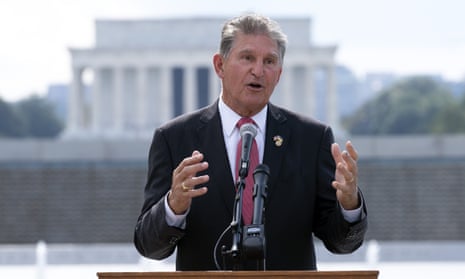Joe Manchin’s decision to kill off sweeping US climate legislation has been called “nothing short of a death sentence” for younger people and a livable climate on Earth, amid an outpouring of anger and despair from activists, scientists and even many of the US Senator’s Democratic colleagues.
Manchin, the centrist West Virginia senator who has become a millionaire through his founding of a coal-trading company in his home state, dealt a crushing political blow to Joe Biden’s agenda on Thursday night when he made clear he would not support any spending to curb the climate crisis in a proposed bill.
The loss of Manchin’s swing vote in an evenly divided US senate means it’s now probable America will remain without legislation to cut planet-heating emissions for several more years, imperiling national and international climate goals and further escalating deadly wildfires, droughts, floods and heatwaves around the world.
“Given the US’s role as the leading all-time carbon polluter, it is difficult to see global action on climate without US leadership,” said Michael Mann, a climate scientist at Penn State University, who called Manchin “a modern-day villain, who drives a Maserati, lives on a yacht, courtesy of the coal industry, and is willing to see the world burn as long as it benefits his near-term investment portfolio”.
Biden and fellow Democrats have spent nearly two years trying to get Manchin to agree to a huge package of support for renewable energy and electric cars but now appear to have run out of time, with November’s midterm elections increasingly likely to see Congressional control switch to the Republicans, who uniformly oppose action on the climate crisis.
“The stakes for this midterm election couldn’t be greater,” said Mann. “We’re talking about the future livability of our planet.”
Activists were scathing of Manchin and Democrats’ failure to pass climate legislation during their control of both chambers of Congress and the White House with the advent of the Biden administration.
“Senator Joe Manchin has written his legacy: blocking our best shot at a transition to affordable, American clean energy and a livable planet,” said Jamal Raad, executive director of the campaign group Evergreen Action. “Senator Manchin has betrayed the American public and the mandate given to the Democratic Senate to act on climate.”
Varshini Prakash, executive director of the youth-led environmental Sunrise Movement, said: “This is nothing short of a death sentence … It’s clear appealing to corporate obstructionists doesn’t work, and it will cost us a generation of voters.”
Tiernan Sittenfeld, senior vice-president of government affairs at the League of Conservation Voters, added: “There truly aren’t words for how appalled, outraged, and disappointed we are.”
Even some of Manchin’s party colleagues weighed in. Jared Huffman, a Democratic member of the House of Representatives, called Manchin a “wrecking ball” and a “very corrupted, compromised man”.
Scientists say the US, and the world, must cut emissions in half this decade, and get to net-zero emissions by 2050, to avoid breaching internationally agreed temperature limits and pushing the world into catastrophic climate impacts.
Last month was the hottest June on record globally, US space agency Nasa said on Thursday, and record heatwaves are ravaging the US, Europe and China. Meanwhile, huge sequoia trees that are thousands of years old are at risk from burning down in vast wildfires in California.
Biden, who has called the climate crisis “the greatest existential threat of our time”, had hoped to pass a major bill to lower emissions via tax credit incentives for wind, solar and other low-carbon energy, as well as support for electric vehicles and other measures.
But Manchin, who has received more money in political donations from the fossil fuel industry than any sitting senator, sank the broader Build Back Better legislation last year and now has seemingly halted Democratic efforts to revive the climate measures in a new bill. Analysts say without any new bill, the US will fall about halfway short of its emissions-cutting target.
The West Virginia lawmaker has cited concerns over inflation, now at a 40-year high, as to why he has refused to commit to a new climate package that would have totaled about $300bn and stood as a crucial long-term strategy to stave off global heating.
“Political headlines are of no value to the millions of Americans struggling to afford groceries and gas as inflation soars to 9.1%,” said a spokesperson for Manchin.
“Senator Manchin believes it’s time for leaders to put political agendas aside, reevaluate and adjust to the economic realities the country faces to avoid taking steps that add fuel to the inflation fire.”
Biden will now have to face the consternation of other governments, with a United Nations climate conference set to take place in Egypt in November, and try to craft a series of executive actions to make up the shortfall, although a recent supreme court ruling, in a case out of West Virginia, has limited the scope of his government’s response.
“Manchin’s decision is a bitter pill, for both US and global climate action,” said Paul Bledsoe, a former Clinton White House climate adviser, now with the Progressive Policy Institute.
“Ironically, the bill he rejected would have created millions of new American jobs, jumpstarting the US clean energy economy while reducing both emissions and long-term inflation, goals Manchin claims to embrace.”
